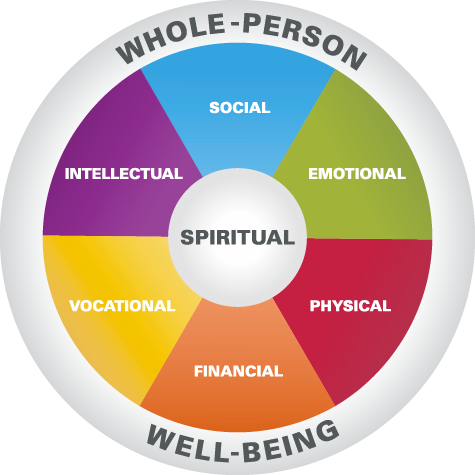Wholeness Wheel Bible Study
Leader Resources
Overview

The call to wholeness is a lifelong journey. At different times, we each will find some parts easy and others challenging. Helping young people understand different elements of well-being can help them establish practices that honor their individuality and strengthen their faith. This Bible study includes a variety of questions and texts to dive into. It can be done individually, in pairs, or in groups.
The youth study includes five steps:
- Most of the reading sections include two texts: one a positive example, and one a negative example.
- The recap section serves to set the texts in context and help with reading comprehension and analysis, although additional context should be provided when appropriate.
- Reflect questions ask the participants to connect the topic to their own lives.
- Plan questions suggest a specific action or writing action to take.
- The prayers are simple, following a repeating template, and can be used as a starting or ending prayer for longer group prayer time.

This Leader Guide includes the youth questions as well as these additional resources:
- Consider notes suggest additional guides for leading group discussion.
- Occasional care notes highlight particular passages and topics that may specifically impact vulnerable participants.
- Connect invites you to reflect on your own wholeness as child of God and youth leader.
- The challenge and pray for sections are similar to the youth’s “plan” and “pray.”
The digital Youth Bible Study includes a personal journaling survey in each module that participants age 13+ can use to write out answers to the questions, as well as thoughts and notes. They can then email their writing to themselves at the end of each module.* This digital Leader Guide doesn’t include a journaling function, but you can take notes on paper or download and print the PDF version and use the notes areas provided.
*The personal journaling surveys are confidential and will not be read or shared with anyone other than the email address provided.
Jump to:
Spiritual | Social | Emotional | Physical | Financial | Vocational | Intellectual
Spiritual Well-Being
Read: Matthew 28:16 – 20
Recap: “Baptism is not simply plain water. Instead, it is water used according to God’s command and connected with God’s word.” (ELW p.1164; Small Catechism) What does baptizing people have to do with remembering Jesus is with us?
Reflect: This Bible study focuses on wholeness and health in the areas of social relationships, emotional well-being, our bodies, finances, vocation and calling, how we use our brains, and how we relate to God. How does your faith show up in your everyday life? What does baptism mean to you?
Plan: As you look at the study ahead, how will you engage? Will you journal, draw, converse with a prayer partner, or something else? Name a trusted adult you will ask to walk with you if the topics become difficult.
Pray: Holy God, you know me wholly. Thank you for claiming me in baptism. Be with me as I study how your Word speaks to my life in so many ways. Amen.
LEADERS:
Consider: Most youth will not remember their baptisms, but they may have recently completed confirmation (Affirmation of Baptism). Do they see the two as connected? What water rituals might start or end your Bible study time together to help remind everyone of God’s love expressed in baptism?
Connect: Read Luther’s explanation of baptism in the Small Catechism. What parts speak grace to you? What parts are difficult?
Challenge: Read the baptismal promises your youth affirm at confirmation. How can you remind yourself of these in your own life as beloved child of God?
Pray for… reminders of how God claims you in baptism.
Social Well-Being
Read: Job 2:11 – 13; Luke 22:24 – 27

Recap: At this point in the story, Job has lost everything: stuff, family, and health. Meanwhile, the disciples have been traveling with and learning from Jesus for a while. What do you see as the differences between how Job’s friends and Jesus’s disciples cared for each other?
Reflect: Which of these sets of friends are like your friends? Which story of people interacting is the kind of friend you would like to be to others? Name some qualities you value in a friend.
Plan: Are you the kind of friend you want to have? How can you learn from these two stories to be healthier in how you connect with others?
Pray: God of relationships, you call us friends. Thank you for the people you have put in my life, and help me to care for my relationships with them. Amen.
LEADERS:
Consider: How do your youth relate to each other? Are they friends outside of church? Do they attend the same schools or engage in the same social circles? How do they experience in-person relationships like youth group differently from internet-based relationships or social media?
Connect: Where do you find social and interpersonal connections? How do you tend to your boundaries as a leader while still finding places to connect?
Plan: When is the next time you will get to have socialization outside of church leadership and work?
Pray for… your friends.
Emotional Well-Being
Read: John 11:32 – 35; John 18:7 – 10
Recap: In John 11, Jesus has just found out that his friend Lazarus has died. In John 18, Jesus and the disciples are in the garden and Jesus is about to be arrested. Why did Jesus cry when he knew he could (and would) raise Lazarus from the dead? Do you think Peter drew his sword out of anger or out of fear?
Reflect: What emotions influence you the most? When you have strong emotions, how do you respond? Where in your body do you feel your strongest emotions?
Plan: Peter’s emotions, while understandable in the moment, led him to violence. When strong emotions move you to action, what healthy responses can you plan to take, rather than ending up with damaging reactions?
Pray: God who weeps when we weep, thank you for walking with me. Help me to find ways to express my emotions in healthy ways. Amen.
LEADERS:
Consider: Christ’s incarnation came with emotions. Weeping is not the only example of Jesus having deep feelings. What other examples can your youth name of Jesus being in emotional situations?
Care: Some youth are over-sharers and some are under-sharers when it comes to emotions. Help your youth find a healthy balance for themselves and the group.
Connect: How do you care for your emotional state when working with youth? What outlets do you have for strong emotions?
Challenge: As you prepare for your next big youth event or travel, plan as well for time to appropriately care for your emotional wholeness.
Pray for… space to tend to your needs even as you care for others.
Physical Well-Being
Read: 1 Kings 19:4 – 8; Mark 11:12 – 14
Recap: Here are two stories about how hunger can affect our whole being. How did Elijah respond differently than Jesus in his hunger? How did caring for his body’s needs help Elijah’s ministry?
Reflect: When you have been hard at work, what is most important for your body? What kind of physical care comes easiest to you, and what do you need to ask for help with?
Plan: Name one, five-minute task that you could add to your week to take better care of your body.
Pray: God who became human, thank you for my body. Help me to care for my physical wholeness as you care for me. Amen.
LEADERS:
Consider: There are many quick phrases and mantras that can help groups help each other stay physically healthy. Work together as a group to develop ways to check in on yourselves and each other and remind each other of the need for physical care.
Care: Everyone has unique ways of relating to their bodies, but youth and teens can have specific challenges related to eating, sleeping, and otherwise caring for this gift. Perhaps they don’t recognize their body and health as a gift and will struggle with this language. Know your limits when walking with youth with these struggles, and pay attention to your own needs even as you pay attention to theirs. Be mindful of differing physical abilities as well as the pressure an image-driven culture puts on teenagers that might lead them to unhealthy dietary or exercise practices and self-harm.
Connect: What aspects of your body are you most likely to listen to, and which do you ignore? How does your body tell you when you are stressed, tired, or in need of care? What keeps you from listening?
Challenge: What is one small step you could take today to improve how you care for your body?
Pray for… patience, healing, and rest.
Financial Well-Being
Read: Luke 14:28 – 32
Recap: Jesus tells this parable in the middle of a longer conversation about the impact of being a follower. Besides towers and wars, what other kinds of plans do you think the people of Jesus’s day needed to make?
Reflect: What kinds of plans and preparations do you make in your life? How has planning ahead helped you? What is one thing you wish you understood better about managing money? What finances are you responsible for now, and what will you be responsible for in the future?
Plan: Examine your current financial life: Make a comprehensive list of your income sources (no matter how small) and expenses. What are financial necessities and what are luxuries?
Pray: God of all things, thank you for all that I have. Help me to plan well to care for what you have given me. Amen.
LEADERS:
Consider: Have your youth look at the congregation’s budget or the youth group budget. What do they think of how finances are talked about in the congregation? What changes would they make?
Connect: In your own financial planning, do you feel more comfortable or anxious? What areas give you the most stress? What might this parable have to say to your financial wholeness, either in the short or long term?
Challenge: Take some time to check in with your own relationship with money. What concrete steps would help you feel more whole in this area?
Pray for… confidence in managing what you have been given.
Vocational Well-Being
Read: Genesis 40:1 – 8; Jonah 1:1 – 3
Recap: Joseph ended up in jail because of a string of events after he shared interpretations of his dreams to his brothers. Even so, he didn’t stop doing what God had equipped him to do and interpreted the dreams of the cupbearer and the baker. Meanwhile, Jonah fled from what God asked him to do. Why do you think Joseph kept interpreting? Why do you think Jonah ran?
Reflect: What are you good at? How might you use those gifts to serve God? Is it hard to share your gifts with God and others?
Plan: Take some time to note what you are good at. Look for ways you can thank God for that gift by helping others.
Pray: God who calls us to serve, thank you for the things I love doing. Help me to celebrate everyone’s gifts and to use my gifts for you. Amen.
LEADERS:
Consider: Have your youth name each other’s gifts so that everyone is lifted up and has a celebrated role. Ask if anyone has something they think they could be good at but have never had the chance to try. Vocation doesn’t have an end; it is constantly evolving. If appropriate, share your own vocational story: what you do and how God led you there. If you have a job or career outside of church, be sure to include that as well as sharing why you are involved with youth ministry.
Care: Jonah’s story is often used to talk about running away from God, but its themes are also sometimes echoed by suicide attempt survivors. (See Jonah 1:6, “[Jonah] said to them, ‘Pick me up and throw me into the sea; then the sea will quieten down for you; for I know it is because of me that this great storm has come upon you.’”) Be sensitive to youth who have a hard time imagining a future with them in it.
Connect: When we talk about vision, “where” can mean so much more than geography: it is also who, what, when, and why. Which question words speak to your vocational wholeness or gaps right now?
Challenge: Make a map of the “where” of your current vocational state. Sketch out key events, people, and Spirit-stirrings that have led you to this point. Then add in ideas of vocational imagination for what’s next.
Pray for… clarity of call for yourself and those you care for.
Intellectual Well-Being

Read: Luke 2:41 – 47; Matthew 22:29 – 33
Recap: What were people curious about in each story? Who do they learn from and how?
Reflect: What makes you curious? Is it a school subject or something else? Where do you go to find more knowledge about it?
Plan: Write down a question you are curious about. Where can you look for reliable information? Who can help you stay curious and ask more questions?
Pray: God of curiosity, thank you for those who teach me, both at school and in the world. Help me to stay curious and ask my questions. Amen.
LEADERS:
Consider: Not all intellectual wholeness is about grades and school. How can both leaders and youth celebrate each other’s curiosity when it may be rooted in very different spaces?
Connect: Outside of work and church, what makes you curious? What do you wish you had time to learn more about? What’s holding you back?
Challenge: What is one thing you could do today to indulge your curiosity?
Pray for… curiosity and partners in investigation.
About the Author: The Rev. Amanda Nesvold is a pastor who has served congregations in upstate New York, Wisconsin, and Maryland. She enjoys exploring outside-the-box ministry and learning new crafts and hobbies.
Portico plan members can find more information and resources about the Wholeness Wheel on myPortico.
Scripture is from the New Revised Standard Version Bible, copyright © 1989 by the Division of Christian Education of the National Council of the Churches of Christ in the USA. All rights reserved. Used with permission.
“Christ Calls Us to Wholeness” is published by Portico Benefit Services, ©2025